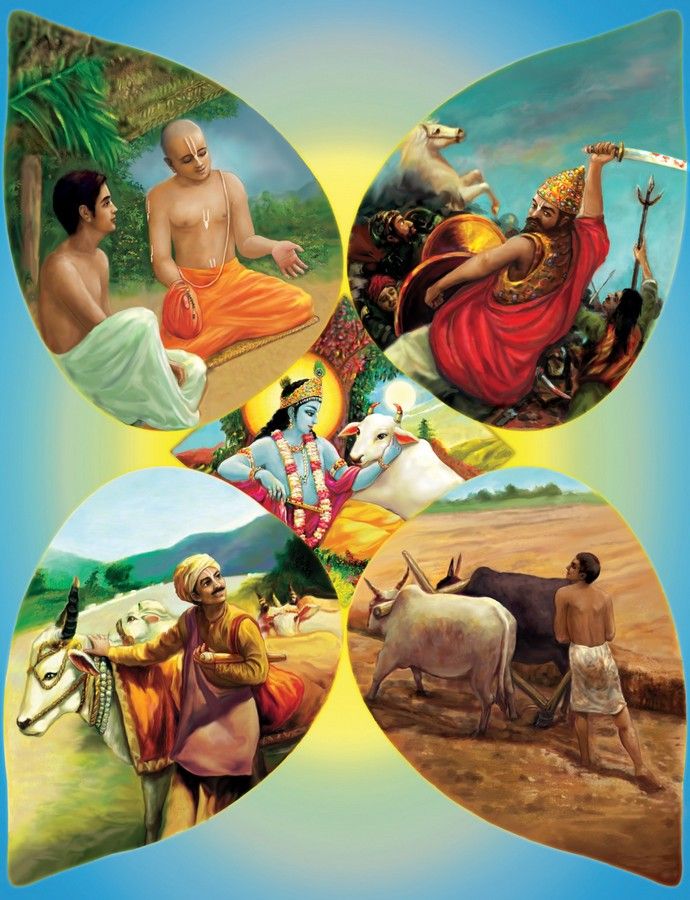Question.1: In our pursuance of Vedic society in Krishna Consciousness, would it mean that I should stop working and manage only household activities or activities related to the temple, after marriage?
Question. 2: In my limited interaction with the devotees, I have found devotees pursuing a job for sustenance and enjoying only things related to Krishna Consciousness. And couple of them have given up their further education in pursuance of Krishna Consciousness.
Here is my second question: When we are living in the material world, why not perform the best things possible in the material world too. It is something like exercising daily which keeps your body fit, and unless you are in decent health you cannot perform your devotional activities. When we have to carry out devotional activities in the material world, we need money too. So what is wrong in pursuing further education or getting a better job and performing them for the service of Krishna when you are capable of doing it… or providing your family better conditions to prosper both in the material and spiritual world?
Answer by Romapada Swami:
The Vedic way of life is all-encompassing — it takes into account all necessary ingredients for perfectly conducting our daily affairs in this world too, whether within the family, society or occupational field, considering one’s overall physical, emotional and intellectual well-being as well. If you deeply understand the varnashrama system, you will come to appreciate how scientific and brilliant it is, much superior to our modern social setup, which begins to look ill-defined and lop-sided in comparison! The entire society is so organized in a varnashrama such that each member is engaged perfectly, just according to their natural propensities and in a manner that will progressively help them mature spiritually.
The Vedas prescribe two different types of occupation — pravritti marga and nivritti marga. Pravritti marga is the path of gradual material elevation, where even though there is the propensity for material enjoyment and economic development, it is regulated under Vedic injunctions. Thus, the kind of occupation one does, the activities of grhastha asrama, how one earns and spends his money etc are all performed within the purview of religious principles, guided by scriptures and brahmanas. This arrangement helps one become peaceful and satisfied in material life, and further one becomes gradually detached from the sense of “me and mine” and progressively develops an attitude of service and devotion to God. Whereas, pursuing these goals without such guidelines makes even material life very complex and unpredictable, and only makes one more attached and entangled in the complicated cycle of karmic reactions.
On the other hand, when someone is already sufficiently renounced, and doesn’t feel the need for such social engagements and economic gains, they are encouraged to follow the ‘nivritti marga’ or the path of gradually reducing the degree of one’s involvement and entanglement with matter, in favor of gradually increasing one’s full engagement in direct service to God and for the spiritual benefit of the entire society. Such devotees are not losing out on the pleasures of this world; rather, they have strong enough faith and realization that all needs are fully satisfied simply by watering the root. Note that one who is not yet ready for such a life is never artificially induced to do so. Krishna discouraged Arjuna’s proposition to withdraw from his duty and retire to the forest, saying that such premature renunciation will only make him a mithyacara (pretender) [cf. BG 3.6]. However, those who are capable of dedicating themselves in that way are rendering a great service and should be ecouraged by all means. Either of these paths, pravritti or nivritti, is approved by the Vedas, if it is taken up properly.
Having said that, it should also be stated that although pursuing a higher degree or a career in today’s society is much respected, it is not necessarily the ‘best thing’ one can do, even in the material world, and it may not always be conducive to the service of Krishna — while certainly in other circumstances, and with proper guidance and consciousness, it can be very conducive. One must tread with great caution in this area, and seek close guidance from realized devotees to do this properly. In our Krishna consciousness movement, we do not have ‘policy’ either way: to prohibit or to promote to pursuance of a higher material education or career path; however, depending upon the qualities of a particular individual, it may be a much less optimal and fruitful option, compared to a thoughtfully pursued course of life that is based more closely on Vedic, Krishna conscious principles.
Although there is nothing wrong with an education or occupation that supports one’s Krishna conscious practices, (taking the example of none less than Arjuna himself), where are such pure occupational engagements to be found in today’s world? Because the purpose and goals of the larger society are completely materialistic and theistic in name only at best, most career and educational options and the environment in which one must pursue them are all highly polluted, and diametrically opposite to the principles of a spiritual way of life. Even the most innocent-sounding jobs for the highly educated are actually often very unwholesome, and not very conducive for a life in the mode of goodness, as well as being full of competition, exploitation and stress. Many of these occupations are not even geared towards the actual welfare of society but are meant to cater only to artificial comforts of life.
Many people even in the western world are beginning to recognize the serious imbalances and frustration caused by the present materialistic socio-economic setup and the stereotyped occupational roles for earning one’s livelihood, and are looking for alternatives. The daivi varnashrama system which Srila Prabhupada has painstakingly outlined and brought to us can offer just that perfect alternative. Srila Prabhupada very much wanted that young and intelligent people should come forward to deeply understand and adopt these wonderful principles. If they set ideal examples, the common people who are all suffering due to being misled by irresponsible leaders will appreciate the difference and begin to follow. (yad-yad-acarati sresthas tad tad evetaro janah, BG 3.21)
In a Vedic society, the services of a teacher or a priest, and similarly those of a mother or a chaste wife, are very highly valued —- because these individuals play a vital role in molding the character of the society. The brahmanas are the guiding intelligence of the social body, and on the women rested the heavy responsibility of preserving the culture and sanctity of the society. They were not merely menial or ‘secondary’ roles taken on by those who are incapable of anything better, as it happens to be in present day society. In contrast, fields such as engineering, medicine and economics which are highly valued in the modern culture were given only a third-grade importance in Vedic society. Seen in this light, the devotees who have seemingly given up higher education or career in pursuance of Krishna consciousness are actually pursuing a much superior form of education / vocation. Devotees who are sincerely dedicating themselves to raising God-conscious children, or for the cause of spiritual education of others, are contributing *much* more meaningfully to their own welfare as well as that of their families and society, than they could have by merely pursuing a means of livelihood or career with no higher purpose!
The intention of this discussion is not to convince or pursuade you in any way or to suggest what any individual devotee should or should not do, but simply to minimally help appreciate the merit of the decision of those who have fully adopted the Vedic mode of life, over and above the modern paradigm. There are no hard and fast rules in molding one’s life towards either model, but devotees are encouraged, without being coerced, to adopt these principles according to the degree of faith, conviction and realization that they personally have, their personal situations and in consultation with experienced devotees in matters of how to effectively apply this in individual situations.
To the degree that we can adopt these time-tested and compassionate teachings of our previous acharyas and sages, to that degree we will benefit and also serve as beacons of real-world examples, thereby nurturing the faith of others in the effulgent teachings as being practical in today’s active world.







